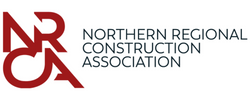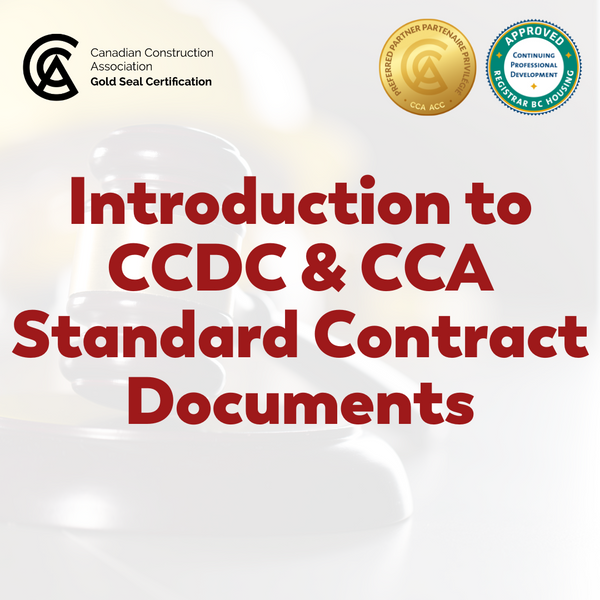Product Overview
This comprehensive course will walk you through contract documents used at various stages of a project, from what is required to form a valid contract, the components in a tender call/invitation to tender, document hierarchy, to change orders and directives, and more! If you work with construction contract documents in your role, this course is for you.
Description
This comprehensive course will walk you through contract documents used at various stages of a project, from what is required to form a valid contract, the components in a tender call/invitation to tender, document hierarchy, to change orders and directives, and more! If you work with construction contract documents in your role, this course is for you.
The Engineers Joint Contract Documents Committee (EJCDC®) defines construction documents in the following way:
Construction Contract Documents are the written documents that define the roles, responsibilities, and “Work” under the construction Contract, and are legally-binding on the parties (Owner and Contractor)
This is a broad-scope definition which implies that there are many different types of documents involved which is, in fact, true. Understanding the difference between the contract and the various construction contract documents and the role they play is key to the successful execution of a construction project.
Construction documents may include: Prequalification Forms; Tender forms and documents; Addenda; Construction drawings and plans; Articles of agreement, definitions and general terms & conditions; Supplementary general terms and conditions; Change orders and directives; Schedules; Shop drawings; Financial breakdowns; Statutory declarations; and, Bonding agreements.
Course content will cover:
- Contract Law Fundamentals
- Contracts vs Contract Documents
- Rights and Responsibilities
- Primary vs Secondary Rights
- Primary vs Secondary Obligations
- Assignment of Rights
- Assignment of Obligations
- Procurement Options
- Tender Documents
- Bonding
- Prequalification
- Addenda
- Construction Contract Arrangements
- Documents which Form a Contract
- Contract Form Arrangement
- Hierarchy of Documents
- Changes and Extras
Learning Outcomes
By the end of this course you will be able to:
- List the elements required to form a valid, enforceable construction contract
- Differentiate between the contract and the contract documents
- List and discuss common components of a tender call/invitation to tender
- Describe various tender/bid documents
- List eight common contract documents in order of their hierarchy with respect to common rules of interpretation
- Differentiate between changes, change orders and change directives
- Discuss how changes to the contract are interpreted legally
Who should attend?
If you work with construction contract documents in your role, this course is for you.
All stakeholders in a construction contract need to understand the documents, whether you are a business owner, estimator, project manager, field engineer or supervisor you will need to access and understand the documents and their various roles and forms. This course will be helpful for those new to the topic and seasoned professionals will find this to be a good refresher.
Recommended Prerequisites
- We recommend that students have some experience and knowledge in the topic of construction project management/administration.
- Those with less experience are welcome to attend but may find it hard to appreciate the material without prior experience or context.
Industry Credits
- This course is a CCA Gold Seal Certified Course (1 Credits)
- This course is worth 6 Informal Continuing Professional Development (CPD) credits as approved by BC Housing.
Course Format
- Live, Online, Instructor-led training.
- This course is facilitated by the instructor on the Zoom platform. Access information will be provided to you in advance of the training.
- You will be expected to have your webcam on during the class and participate in group discussions and other activities with your instructor and classmates during the course.
- This course is delivered in partnership with local construction associations. You will be participating with a cohort of industry peers from multiple regions.
Course Requirements (Technology & Participation)
Please make sure you have the following:
- Computer or laptop with webcam: This course will involve on-screen interaction with your instructor and classmates, reading/viewing on-screen content like slides or videos, and interacting via typing with questions or responses. For this reason, we recommend that you have a full computer/laptop set-up and don’t recommend using a cell phone or tablet to attend the training.
- A quiet space with minimal distractions: plan to be fully engaged in the class and clear your work schedule just as you would for attendance in an in-class program.
Refunds or Transfers:
- Five (5) or more business days before the course start date: Full refund of registration fees or can be transfers to a different course date.
- Less than five (5) business days before the course start date and course no-shows: No refunds or transfers to future course dates.
- For a complete document on the NRCA Education Policies, click here.
Other Policies
- Substitution of another member of your company/team is permitted up to the course start date for no additional fee.
- Unless otherwise stated, every person able to see, hear, and observe the virtual course sessions must be a paid participant. Non-compliance of this requirement will result in removal from the course. Refunds will not be issued to students who are removed from the course for non-compliance of this requirement.
- If the NRCA has to postpone or cancel courses due to insufficient enrolment, NRCA will refund the registration fee or, if possible, the attendee may choose to move to an identical session in the future.
About The Instructor - Ralph Lembcke, P.GSC
Ralph’s construction career has taken him from estimator to project manager, then to self-employed contractor, and finally to a 30-year career as a professor with the Donald J. Smith School of Building Technology at Fanshawe College in London, ON, where he still teaches part-time. He was a 25-year member of the Canadian Institute of Quantity Surveyor (PQS - Professional Quantity Surveyor) and is currently a charter member of the Construction and Design Educators Council of Canada (CDECC). Ralph sits on the board of advisors for the CDECC as well as for an Ontario-based construction company. Ralph holds a certificate in Construction Engineering Technology and Management from Fanshawe College, a teaching certificate from St. Clair College and a Professional Gold Seal certification from the Canadian Construction Association.








